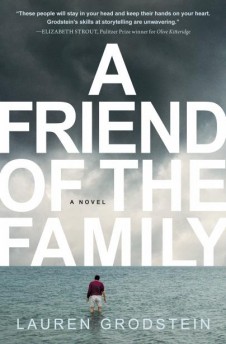 Reviewed:
Reviewed:
A Friend of the Family by Lauren Grodstein
Algonquin, 304 pp., $23.95
Lauren Grodstein’s A Friend of the Family introduces its stolidly suburban protagonist, Pete Dizinoff (“Dr. Pete”), through a memory — a reminiscence of the morning, years past, when the collapse of the Soviet Union was announced in American papers. While his dear friends declare it a moment of promise, Pete is immediately on guard, “bizarrely afraid” as the familiar global balance comes to an end. “The cold war was stasis, Elaine,” he explains to his wife. “Us versus them, good versus bad. Instability, especially in that part of the world, is dangerous. This makes me concerned. Not panicked, but concerned.”
It’s a moment concise in its characterization and elegant in its presentation of the unwaveringly self-assured, moralistic worldview that Pete uses to navigate his daily life. He is a talented internist with a knack for “specialty cases, the sleuthy diagnoses nobody else had been able to figure.” His wife is loyal and caring, deferring to his judgment on everything from “matters of international consequence” to “the paying of bills, the hiring of plumbers.” Pete is not a man accustomed to being wrong — or even questioned — until Laura Stern, the daughter of his best friend, reenters his life and begins showing an interest in his son Alec. Believing himself to be acting in Alec’s best interest, Pete sets about breaking the couple apart.
What follows could be considered a comedy of good intentions gone awry, were it not for the grim circumstances of Laura’s past and the horrible, redoubling consequences of Pete’s meddling. Early on, we learn that Laura gave birth to a premature baby in a library bathroom when she was only seventeen, immediately killed the child, and hid its body in a dumpster behind the building. It’s a profoundly disturbing revelation — even more so once Laura is introduced: she is attractive, charming, intelligent, and outspoken. But for Pete, her past actions forever define her as, among other things, uniquely unsuited for his son. The novel becomes hinged on Pete and Laura’s sparring match — an increasingly deceitful and manipulative power struggle that seems much less about winning Alec than about simply besting the other.
Grodstein’s ability to make Pete and Laura frequently sympathetic (when they can also be troubling, even repellent) is remarkable. Where other characters in A Friend of the Family have clear motivations and react to situations in straightforward ways, Pete and Laura are complex, deeply selfish, and often confused — characters whose motivations and actions require readers to consider their own.
We may objectively recognize that Pete’s investment in his son’s life and future verges on obsessive. When Alec shows no interest in applying to colleges, Pete writes the entrance essays and submits the applications for him. When asked if he “would want Alec married and miserable for your sake or happy and alone for his?” he instantly replies, “Married and miserable…as long as there are grandchildren.” But even if his notions of what’s best are severely limited in scope and unrelated to Alec’s own aspirations, Pete’s protective impulses and genuine concern for his son are difficult to fault.
As the novel reaches its climax — a startling confrontation between Pete and Laura — our sense of identification with Pete is complicated by two dramatically different accounts of what takes place. Pete tells us his version of events, of course, but we only receive Laura’s side of the story secondhand. Given the nature of the accusations against him and the volatility of his relationship with Laura, however, the reader cannot help but wonder if Pete has sterilized his retelling in order to maintain his listeners’ empathy, our understanding of him as a concerned and loving father.
Until this point in the novel, Pete’s narration feels inherently truthful. He admits fault, if not real regret, and reveals enough of his own life’s mistakes and indiscretions that any late attempt at deceiving the reader might seem futile. But so little is gained by Pete’s determined intervention — his grand plan for Alec goes entirely unrealized — that one wonders if Laura is the only character capable of real destruction, of causing irreparable harm to another human being. And so Grodstein brings her story full circle, leaving us to question if one act (even, as in Pete’s case, one that may not have happened) can define a person, and whether good intentions are ever as innocuous as they seem.
Larissa Kyzer works at New York University and is a second-year master’s student in the Palmer School of Library and Information Science. She is a contributing book reviewer for The L Magazine, Three Percent, and Reviewing the Evidence, and is learning Danish in her spare time.
Mentioned in this review:

